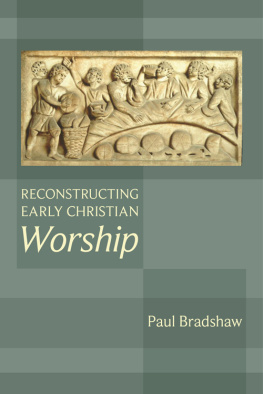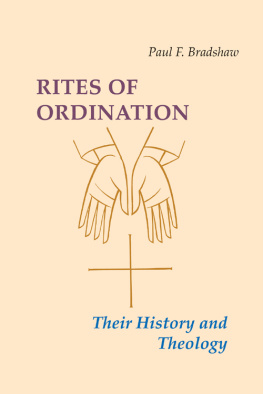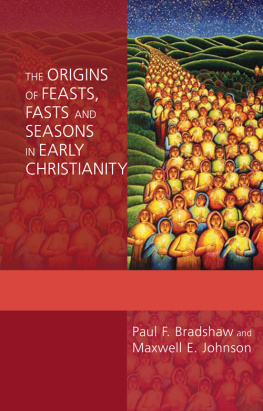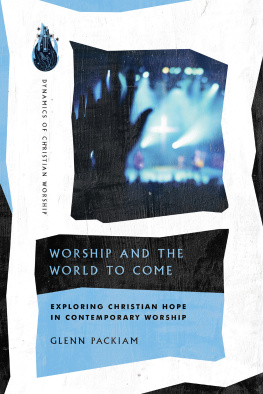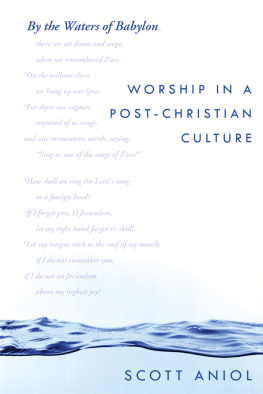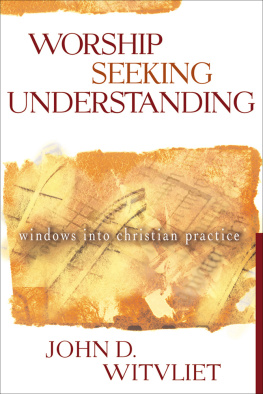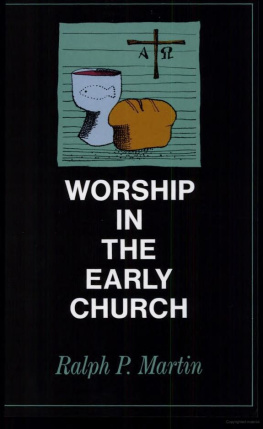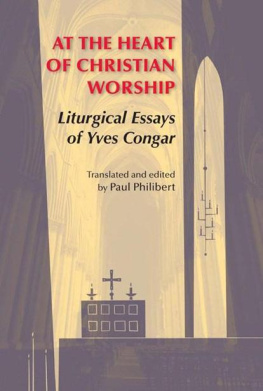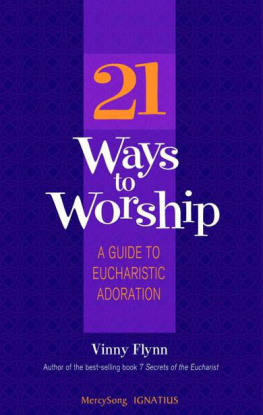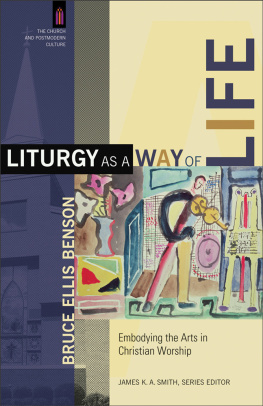Paul F. Bradshaw - Reconstructing Early Christian Worship
Here you can read online Paul F. Bradshaw - Reconstructing Early Christian Worship full text of the book (entire story) in english for free. Download pdf and epub, get meaning, cover and reviews about this ebook. year: 2009, publisher: SPCK Publishing, genre: Religion. Description of the work, (preface) as well as reviews are available. Best literature library LitArk.com created for fans of good reading and offers a wide selection of genres:
Romance novel
Science fiction
Adventure
Detective
Science
History
Home and family
Prose
Art
Politics
Computer
Non-fiction
Religion
Business
Children
Humor
Choose a favorite category and find really read worthwhile books. Enjoy immersion in the world of imagination, feel the emotions of the characters or learn something new for yourself, make an fascinating discovery.
- Book:Reconstructing Early Christian Worship
- Author:
- Publisher:SPCK Publishing
- Genre:
- Year:2009
- Rating:4 / 5
- Favourites:Add to favourites
- Your mark:
- 80
- 1
- 2
- 3
- 4
- 5
Reconstructing Early Christian Worship: summary, description and annotation
We offer to read an annotation, description, summary or preface (depends on what the author of the book "Reconstructing Early Christian Worship" wrote himself). If you haven't found the necessary information about the book — write in the comments, we will try to find it.
Reconstructing Early Christian Worship — read online for free the complete book (whole text) full work
Below is the text of the book, divided by pages. System saving the place of the last page read, allows you to conveniently read the book "Reconstructing Early Christian Worship" online for free, without having to search again every time where you left off. Put a bookmark, and you can go to the page where you finished reading at any time.
Font size:
Interval:
Bookmark:
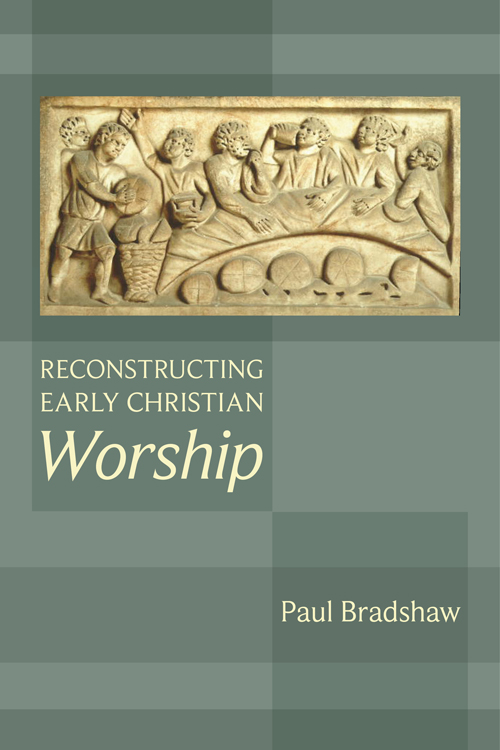
Reconstructing Early Christian Worship
Paul Bradshaw is Professor of Liturgy at the University of Notre Dame, Indiana, USA, and holds a PhD from London University, a DD from Oxford University, and an honorary DD from the General Theological Seminary, New York. Between 1995 and 2008 he served as Director of Notre Dames London Undergraduate Program, and still teaches there periodically. He is an honorary Canon of the Episcopal Diocese of Northern Indiana, priest-vicar of Westminster Abbey, and a member of the Church of England Liturgical Commission. He is also one of only two people ever to have been president of both the North American Academy of Liturgy (199394) and the international Societas Liturgica (199395), and from 1987 to 2005 he was editor-in-chief of the journal, Studia Liturgica. Before beginning to teach at Notre Dame in 1985, he was successively Director of Studies at Chichester Theological College, Course Director in the St Albans Diocese Ministerial Training Scheme, and Vice-Principal of Ripon College, Cuddesdon, Oxford.
Dr Bradshaw has written or edited more than twenty books, together with over ninety essays or articles in periodicals. His major publications include Daily Prayer in the Early Church (SPCK, 1981; Oxford University Press, 1982; Wipf & Stock, 2008), The Search for the Origins of Christian Worship (SPCK/Oxford University Press, 1992, 2nd edn 2002; translated into French and Italian, with Japanese and Russian translations forthcoming), and Eucharistic Origins (SPCK/Oxford University Press, 2004).
This book is dedicated to the one
from whom I constantly learn so much

First published in Great Britain in 2009
Society for Promoting Christian Knowledge
36 Causton Street
London SW1P 4ST
Copyright Paul F. Bradshaw 2009
All rights reserved. No part of this book may be reproduced or transmitted in any form or by any means, electronic or mechanical, including photocopying, recording, or by any information storage and retrieval system, without permission in writing from the publisher.
SPCK does not necessarily endorse the individual views contained in its publications.
Unless otherwise noted, English translations of Scripture and other primary sources are by the author.
British Library Cataloguing-in-Publication Data
A catalogue record for this book is available from the British Library
ISBN 9780281060948
E-ISBN 9780281062973
1 3 5 7 9 10 8 6 4 2
Typeset and eBook by Graphicraft Ltd., Hong Kong
Printed in Great Britain by Cromwell Press
Produced on paper from sustainable forests
Contents
Part 1
EUCHARIST
Part 2
BAPTISM
Part 3
PRAYER
AIR | E. J. Yarnold, The Awe-Inspiring Rites of Initiation (St Pauls Publications, Slough 1971; 2nd edn, T & T Clark, Edinburgh/The Liturgical Press, Collegeville 1994) |
DBL | E. C. Whitaker (ed.), Documents of the Baptismal Liturgy, revised and expanded by Maxwell E. Johnson (SPCK, London 2003) |
ET | English translation |
MECL | James W. McKinnon, Music in Early Christian Literature (Cambridge University Press, Cambridge 1987) |
NPNF | A Select Library of Nicene and Post-Nicene Fathers, ed. Philip Schaff and Henry Wace (1893) |
This book does not pretend to be a complete description of what early Christian worship might have been like. Such a venture would in any case be impossible because of the limitations of our historical information and the caution that modern critical methods place upon what we may assume with regard to the gaps in our knowledge. Instead, it builds upon the approach set out in my Search for the Origins of Christian Worship(2nd edn, SPCK, London/Oxford University Press, New York 2002) and attempts to drill down, as it were, at several key points beneath the surface impression that has been accepted in most earlier studies of the primary sources. Its aim has been to see whether a somewhat different picture emerges when one examines that material with altered presuppositions and a more questioning attitude towards it. Thus, each of the chapters begins from the conventional depiction of its topic, and subjects the sources to an assessment from the perspective of the methodology set out in my earlier work, which then leads to new conclusions. This change in our perception not only affects how we reconstruct our vision of the past but also how we use the past as precedent for worship practice today. As an indicator of the effect that it might have on the latter, each chapter ends with a comment, even if in some cases only brief, on the possible modern application of these discoveries.
Many of the chapters are versions or major revisions of material that has been published in other places. Chapter 1, originally given as a public lecture at the University of Notre Dame in 2006, will also appear in Maxwell Johnson (ed.), Issues in Eucharistic Praying (The Liturgical Press, Collegeville 2010). Chapter 2 is an adaptation of The Reception of Communion in Early Christianity, Studia Liturgica 37 (2007), pp. 16480.Chapter 3 is a new composition that draws in part upon Yet Another Explanation of Didache 910, Studia Liturgica 36 (2006), pp. 1248 and Hippolytus Revisited: The Identity of the So-Called Apostolic Tradition, Liturgy 16 (2000), pp. 711. Chapter 4 is a very substantial revision of The Gospel and the Catechumenate in the Third Century, Journal of Theological Studies 50 (1999), pp. 14352. Chapter 5 is adapted from The Profession of Faith in Early Christian Baptism, published both in Ecclesia Orans 23 (2006), pp. 33755 and in Evangelical Quarterly 78 (2006), pp. 10115. Chapter 6 has been contributed to a forthcoming Festschrift for Bryan Spinks, The Serious Business of Worship, edited by Simon Jones and Melanie Ross (Continuum, London). Chapter 7 is a greatly updated version of Cathedral vs Monastery: The Only Alternatives for the Liturgy of the Hours?, in J. Neil Alexander (ed.), Time and Community: Studies in Liturgical History and Theology (Pastoral Press, Washington, DC 1990), pp. 12336. Chapter 8 is lightly revised from From Word to Action: The Changing Role of Psalmody in Early Christianity, in Martin Dudley (ed.), Like a Two-Edged Sword: The Word of God in Liturgy and History (Canterbury Press, Norwich 1995), pp. 2137. Chapter 9 recently appeared as The Emergence of Penitential Prayer in Early Christianity, in Mark J. Boda, Daniel K. Falk, and Rodney A. Werline(eds), Seeking the Favor of God, vol. 3: The Impact of Penitential Prayer beyond Second Temple Judaism (Society of Biblical Literature, Atlanta 2008), pp. 18596 (Copyright Society of Biblical Literature, used by permission).
PAUL F. BRADSHAW
The answer to the question posed in my title might seem obvious: Of course he did; we have the evidence of the Synoptic Gospels to prove it. But as you may well have guessed already, I do not think it is as simple as that. Otherwise, this would turn out to be a very short chapter.
The Fourth Gospel
Let us start with St Johns Gospel, where there is no account of the institution of the eucharist within the narrative of the Last Supper. Commentators usually say that John has deliberately missed it out and for his own reasons replaced it with the account of Jesus washing the disciples feet. But that is to assume that the Evangelist and every Christian of the time knew that the account of the institution of the eucharist really did belong with the Last Supper, and he chose not to put it there. But that is precisely to beg the question. We do not actually know whether anyone in the first century other than the writers of the Synoptic Gospels and St Paul thought it took place on the night before Jesus died and even St Paul does not say that occasion was a Passover meal as the others do. So if we suppose for the sake of argument that the writer of the Fourth Gospel did not know of a tradition that Jesus said that bread and wine were his body and blood at the Last Supper, is there anywhere else in that Gospel that might look like an institution narrative?
Next pageFont size:
Interval:
Bookmark:
Similar books «Reconstructing Early Christian Worship»
Look at similar books to Reconstructing Early Christian Worship. We have selected literature similar in name and meaning in the hope of providing readers with more options to find new, interesting, not yet read works.
Discussion, reviews of the book Reconstructing Early Christian Worship and just readers' own opinions. Leave your comments, write what you think about the work, its meaning or the main characters. Specify what exactly you liked and what you didn't like, and why you think so.

